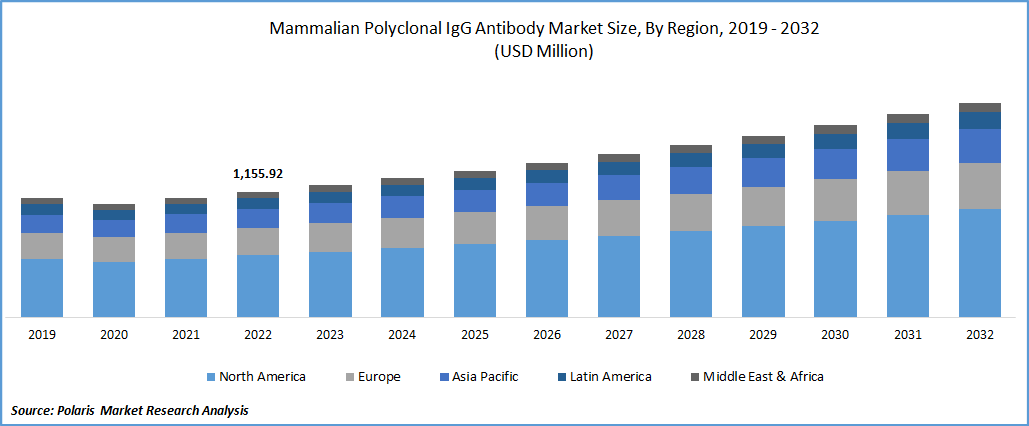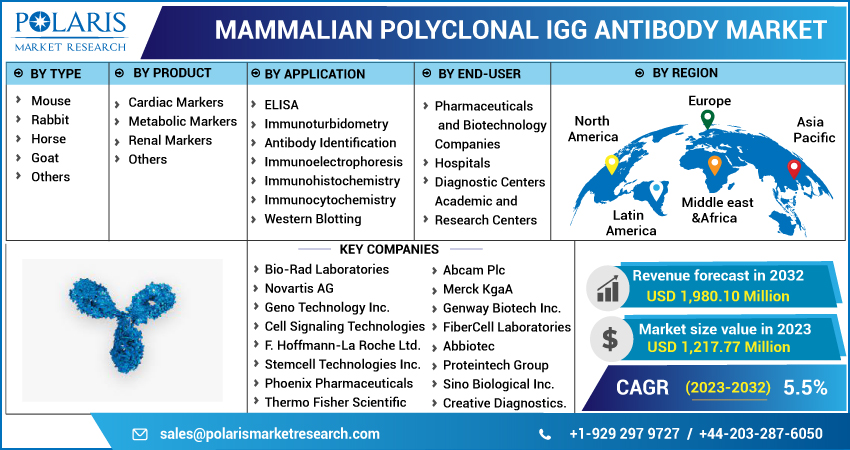
Mammalian Polyclonal IgG Antibody Market Share, Size, Trends, Industry Analysis Report
By Type (Mouse, Rabbit, Horse, Goat, and Others); By Product; By Application; By End-User; By Region; Segment Forecast, 2023-2032
- Published Date:May-2023
- Pages: 116
- Format: PDF
- Report ID: PM3275
- Base Year: 2022
- Historical Data: 2019-2021
Report Outlook
The global mammalian polyclonal IgG antibody market was valued at USD 1,155.92 million in 2022 and is expected to grow at a CAGR of 5.5% during the forecast period. Continuous rise in product demand worldwide due to the numerous types of advantages of the antibodies available and the increase in the proliferation of laboratory tests like ELISA, microarray assays, & flow cytometry are among the key factors propelling the global market growth. Additionally, the change in the popularity of these types of antibodies, as it does not require skilled professionals & significant investments, is also creating huge growth opportunities for the market soon.

To Understand More About this Research: Request a Free Sample Report
Moreover, globally, polyclonal antibodies have gained significant traction as powerful tools in biochemical and biomedical research. Mammalian sources of proteins have widespread use in several therapeutic applications for assessment, detection, and purification. Immunoglobulin G (IgG) is widely used in routine laboratory tests and as labeling reagents in various immunoassay tests, including enzyme-linked immunosorbent assay, which contribute significantly towards the demand and growth of the market in a positive way.
The outbreak of the COVID-19 pandemic has positively impacted the market's growth. The rapid spread of the deadly coronavirus around the world has resulted in a drastic increase in the research and development activities to innovate antibodies for the virus, as many governments have increased their focus on their healthcare infrastructure development, which in turn, the global market had grown drastically during the pandemic period.

For Specific Research Requirements, Request For Customized Report
Industry Dynamics
Growth Drivers
The exponential rise in investments by various large biotechnology and pharmaceuticals companies has led to higher technological advancements in the antibody production processes along with the growing focus on establishing in-house polyclonal antibodies-based products or tests, which are the major factors expected to drive the global market growth over the course of the study period. Furthermore, the rapid increase in the popularity and prevalence of various types of standard laboratory tests, including microarray assays, western blot analysis, immunohistochemical, and cell imaging, coupled with the increasing adoption of novel diagnostic procedures worldwide, are further likely to have a positive impact on mammalian polyclonal IgG antibody market growth.
Report Segmentation
The market is primarily segmented based on type, product, application, end-user, and region.
|
By Type |
By Product |
By Application |
By End-User |
By Region |
|
|
|
|
|
For Specific Research Requirements: Request for Customized Report
Mouse segment is expected to witness highest growth in forecasted period
The mouse segment is expected to grow at the highest CAGR during the anticipated period, which is mainly driven by the blusterous use of these types of animals in the production of polyclonal antibodies because the immune system of the mouse is very similar to the human immune system and the functions and development of their genes of the egg are way same as humans, that help the researchers to mitigate the variability.
The rabbit segment will also likely gain substantial market growth over the coming years because of its high specificity and its enhanced and improved immune response to the small epitopes. Additionally, there are numerous applications of antibodies produced by the rabbits that aid in deciphering immunoglobulins, including ELSIA, western blotting, and immunocytochemistry, which is further anticipated to grow the region’s growth.
Metabolic markers segment accounted for the largest market share in 2022
The metabolic markers garnered the largest revenue share in 2022. The growth of the segment market is highly attributed to a rapid increase in the use of metabolic biomarkers in the diagnosis of diabetes, along with the growing incidences of cancer cases across the globe. The cardiac markers segment is projected to grow at a considerable growth rate during the anticipated period, which is mainly driven by the continuously increasing prevalence of various types of cardiovascular diseases around the world because of the rising popularity of unhealthy eating habits, sedentary lifestyles, and lack of physical fitness or activities among people. For instance, as per the WHO, CVDs are the major cause of death across the globe, with an estimated 17.9 Mn deaths each year, representing about 32% of all deaths.
ELISA segment is anticipated to hold significant market share over forecasted period
The ELISA segment is expected to hold a significant market revenue share over the forecast period because of its growing proliferation and use in various antibody-related tests due to its accurate diagnosis of diseases such as Lyme disease, syphilis, pernicious anemia, viral infections, and AIDS. Additionally, increasing prevalence among many labs to be fully automated ELISA processing systems to expand their range of tests, which is both cost-effective and quick.
However, the western blotting segment led the industry market in 2022 with a healthy market share. The increasing use of western blotting across various healthcare institutions is owing to its several advantageous characteristics, including sensitivity, specificity, better disease detection with very few antibodies, and further reduced laboratory costs. Moreover, these tests have gained significant traction in protein detection due to high protein specificity, propelling the demand and growth of the segment market during the forecast period.
Pharmaceutical and biotechnology companies held the maximum market share in 2022
The pharmaceutical and biotechnology companies segment held the largest market share. The rapid increase in research & development activities and continuously growing investments by both government and private institutions, especially in developed economies like the US, Canada, Germany, and France, along with the rise increased need for developing antibodies to tackle various types of deadly viruses, are among the primary factors influencing the market growth.
The diagnostic center's segment is expected to exhibit the highest CAGR during the projected period, mainly accelerated by the rising number of research activities on improving drug efficacy and personalized medicines. Moreover, diagnostic centers' growing prevalence of various business developing strategies, including partnerships, acquisitions, and mergers, offer more advanced antibodies to cater to worldwide needs.
North America region dominated the global market in 2022
The North American region dominated the global market in 2022 with a significant market share and is projected to maintain its dominance throughout the study period. The regional market growth can be attributed to the robust presence of well-established or equipped research companies and healthcare infrastructure in the region. Furthermore, the early adoption of innovative or advanced technologies and the high focus of major market players on clinical research, supported by various favorable reimbursement policies in countries like the US, are also expected to boost the demand and growth of the market in the forecast period.
Asia Pacific region is expected to be the fastest growing region in the market over the next coming years, owing to the increased prevalence of several diseases like cancer and diabetes, the surge in consumer disposable income, and growing efforts by major players to establish their feet in the emerging economies of the APAC region. Due to the high population burden and government support, the growing demand and adoption of regenerative medicines and innovative antibodies in countries such as India and China will likely impact the market positively.
Competitive Insight
Some of the major players operating in the global mammalian polyclonal IgG antibody market include Bio-Rad Laboratories, Novartis, Geno Technology, Cell Signaling Technologies, Roche Ltd., Stemcell Technologies, Phoenix Pharmaceuticals, Thermo Fisher Scientific, Abcam Plc, Merck, Genway Biotech, FiberCell Laboratories, Abbiotec, Proteintech, Sino Biological, & Creative Diagnostics.
Recent Developments
- In February 2023, Fusion Antibodies announced the launch of its new commercial service from the research and development program, which is specially designed for addressing mammalian cell surface expression. The service will aid the companies in identifying therapeutic antibodies from the focused libraries of sequences.
- In March 2022, ProteoGenix introduced its “XtenCHO Transient Expression System.” The newly developed CHO aims to simplify recombinant protein production & to accelerate the early phase of drug screening further. It has included antibodies from multiple types of species, isotopes, & formats.
Mammalian Polyclonal IgG Antibody Market Report Scope
|
Report Attributes |
Details |
|
Market size value in 2023 |
USD 1,217.77 million |
|
Revenue forecast in 2032 |
USD 1,980.10 million |
|
CAGR |
5.5% from 2023– 2032 |
|
Base year |
2022 |
|
Historical data |
2019– 2021 |
|
Forecast period |
2023– 2032 |
|
Quantitative units |
Revenue in USD million and CAGR from 2023 to 2032 |
|
Segments covered |
By Type, By Product, By Application, By End-User, By Region |
|
Regional scope |
North America, Europe, Asia Pacific, Latin America; Middle East & Africa |
|
Key companies |
Bio-Rad Laboratories, Novartis AG, Geno Technology Inc., Cell Signaling Technologies, F. Hoffmann-La Roche Ltd., Stemcell Technologies Inc., Phoenix Pharmaceuticals, Thermo Fisher Scientific, Abcam Plc, Merck KgaA, Genway Biotech Inc., FiberCell Laboratories, Abbiotec, Proteintech Group, Sino Biological Inc., and Creative Diagnostics. |
FAQ's
The mammalian polyclonal IgG antibody market report covering key segments are type, product, application, end-user, and region.
Mammalian Polyclonal IgG Antibody Market Size Worth $1,980.10 Million By 2032.
The global mammalian polyclonal IgG antibody market expected to grow at a CAGR of 5.5% during the forecast period.
North America is leading the global market.
key driving factors in mammalian polyclonal IgG antibody market are Increasing Adoption Of Novel Diagnostic Procedures.
